Under prescription, individuals take Adderall, a stimulant drug, to treat conditions such as narcolepsy and attention deficit hyperactivity disorder (ADHD). It works by increasing the concentration of norepinephrine and dopamine in the brain. The drug Adderall, with its stimulating effects, is often abused despite its wide medical use.
Adderall can pass through your body’s digestive and blood circulation systems, and your body can excrete it with urine within a maximum of 72 hours, depending on the individual. Traces of the drug may remain in your hair for about 3 months. This duration varies depending on factors like dosage, age, body size, pH of your urine, and overall health.
In this post, we are going to discuss the length of time that Adderall is likely to stay in your system. We will also explore ways of flushing it from your body to enable you to pass a drug test.
How Long will Adderall Stay in Your System?
Patients take Adderall orally with meals or alone. The gastrointestinal tract absorbs and assimilates it into the body, akin to the digestion of food. The body converts some of it into metabolites, like benzoic acid, while the liver deactivates the remainder or eliminates it unchanged in the urine.
The length of time that Adderall remains in your body will depend on the strength of the dose. For instance, the 10mg tablet will stay in the body for a longer time than the 5mg dose. The drug has a half-life of about 10 hours. Thus, if you take 10mg of the drug at midnight, 5mg will have remained in the body by 10 am and only 2.5mg by 8 pm the same day.
Besides dosage, here are other factors that determine how long Adderall stays in your body:
- Body composition – The size of your body, your weight, and the amount of body fat will come into play when taking Adderall. If you have a large body mass, you will require a higher dosage of the drug. In that case, it will take longer for the substance to leave your body.
- Dosage–The immediate-release version of Adderall (which is usually a tablet) dissolves faster than the extended version (capsule). Consequently, the extended-release drug will stay longer inside your body.
- Metabolism–The breakdown of the drug substances depends on the activity of enzymes found in the liver. Several factors, such as your level of activity, gender, and the presence of other drugs within your body, affect your metabolism rate. The higher the rate of metabolism, the faster the excretion rate of Adderall from your system.
Age–As your age increases, there is a higher possibility of Adderall staying longer in your system for the following reasons:
- Your liver will decrease in size as you grow older, thus reducing its surface area for the chemical breakdown of the drug.
- Kidney functioning and activity may decrease as you get older. The passing of urine may also reduce as you get older. Both factors will reduce the rate of getting rid of Adderall.
- The gastrointestinal tract absorbs the drug into your body. The liver will then metabolize it while the kidneys work on getting rid of it. If any of the mentioned organs are not functioning optimally, Adderall will remain longer inside your body.
- If you have low pH urine, the drug will be eliminated from your body faster than if it was higher.
Safe Dosage of Adderall
Adderall comes in two forms: the immediate-release and extended-release formulas. When treating ADHD, 5mg oral doses are administered, though it could be raised to 10mg. The dosage of the immediate-release version of the drug should not exceed 40 mg per day or 30mg for the extended version. To administer more, you need to consult a qualified physician.
Doctors recommend the immediate-release version of the drug for narcolepsy, administering it to patients in doses ranging from 5mg to 60 mg per day. Patients should not exceed a maximum dosage of 60mg without their doctor’s recommendation. Otherwise, it could lead to overdose and subsequent addiction.
Is Adderall Addictive?

Like other stimulants, Adderall can be addictive if you misuse the substance. Once addicted, it is likely to affect many aspects of your life, such as your general health, your relationship with others, the ability to work, education, etc. Some of the symptoms of Adderall addiction include:
- Having a general craving for the drug
- Taking a more massive dose of the substance than recommended
- Using it longer than the period prescribed
- Spending much of your time looking for Adderall, consuming it, or recovering from its side effects
- Continuing using Adderall despite causing you physical and psychological problems
- Exhibiting withdrawal symptoms once you stop using the substance
- Building tolerance in the use of the drug, such that you use a bigger dose to obtain the same results as before
Drug Tests for Adderall
The simple answer is that if you’re wondering whether Adderall will be detected as a drug, it’s likely to show up on the test. Therefore, when you test positive on the drug test, you can explain that you are taking Adderall as prescribed by your physician.
That said, it is essential to note that although Adderall is not detected in a urine test, it is usually distributed throughout the body. It can be detected by conducting different tests, as shown below:
| Test Type | Time taken to detect | Notes |
| Blood Test | Up-to 46 hours | The concentration of the drug in the blood is usually optimal about 3 hours after use. |
| Saliva Test | 20 to 50 hours | It may fail to show up for about an hour after using the drug. Saliva tests may be contaminated if you are a smoker or after using other drugs. |
| Urine test | 48 to 72 hours | The drug will be in high concentrations in the urine,which is the primary avenue for its removal from your body. |
| Hair follicle test | Up-to 3 months | Adderall will not be detected for about the initial two weeks after ingestionThis test type is not common but may be done if an extended period has elapsed since the drug was last taken |
How to Get Adderall Out of Your Body
There are many drugs on the market claiming to be capable of flushing Adderall out of your body. For instance, there is a myth that vitamin B3 releases any toxins found inside the body. However, there is no absolute proof to support this claim.
Some drugs purport to interfere with the drug tests on Adderall to influence the results. These masking agents are also easily identified in the test samples of the drug. Maybe this explains why most cheating athletes are caught in doping cases.

The human body undergoes processes that help cleanse itself from foreign materials. Therefore, the best way to get rid of Adderall is to stop using the drug and allow your body to remove the substances naturally.
It might be tricky to stop using the substance, especially if you have a high dependency on it. The good news is that the withdrawal symptoms are not fatal; just seek treatment and wait for them to disappear.
Duration of Adderall Withdrawal
The time taken to get rid of Adderall will be different for everyone. It might take you as little as several days to stop experiencing its effects or withdrawal symptoms, or even several weeks. The factors affecting this length of time include the dose taken, frequency of administering the drug, and the overall duration you have been using it.
Withdrawal Symptoms of Adderall
Once you stop using Adderall abruptly, it is likely to affect you to the point of developing the symptoms such as:
– Agitation and aggressive behavior
– A slow heart rate
– Insomnia
– Depression
– Fatigue and slowed movements
– Excessive cravings
– Vivid dreams
– Breathing problems
The Takeaway
Adderall is very effective in treating narcolepsy and ADHD. You should take it in the recommended dose so that it remains helpful and leaves your body on time to avoid cases of addiction.
Otherwise, it will increase your dependency on it and the overall time it stays within your system, leading to adverse withdrawal symptoms when you stop using it. In cases of addiction, seek help from your doctor as soon as possible.




